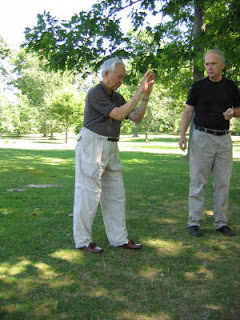The "Facts" as a discussion video link
Learning Classical Tai Chi with Master Stephen Hwa: A Journey of Depth and Patience
Classical Tai Chi is a comprehensive and nuanced system that requires dedication and time to master. Master Hwa's approach emphasizes the underlying principles and internal discipline of Tai Chi, which can take time to understand and integrate fully.
Scientific Rationale
The underlying principles of Classical Tai Chi are rooted in Chinese philosophy and informed by an understanding of body mechanics, joint health, and energy transmission and generation in the body. Master Hwa's teachings emphasize the importance of logical thinking and scientific analysis in Tai Chi practice, departing from the often-used ethereal language used in modern Tai Chi instruction.
On a side note about oft-used ethereal language, Master Hwa often encounters "Doubting Thomas" and "Trolls" on his YouTube pages!
People who troll classical tai chi may do so due to their own insecurities and biases towards the practice. This behavior can be attributed to various factors, including:
- Insecurities and weaknesses: Trolls often target what they perceive as others' weaknesses and insecurities. In the case of classical tai chi, they may be reacting to their own feelings of inadequacy or insecurity about the practice. By mocking or belittling classical tai chi, they may attempt to deflect attention from their vulnerabilities, beliefs, misconceptions, and intolerance of facts.
Regarding "Facts", it is often difficult to persuade with facts because facts often fail to convince minds.
According to various studies and experts, the human mind is wired to resist changing its beliefs and opinions in the face of contradictory facts. This phenomenon is rooted in our evolutionary history, social interactions, and cognitive biases.
Duncan Watts, a social scientist at the University of Pennsylvania’s Annenberg School for Communication. "People don’t actually respond to facts anyway. What people respond to are stories, narratives."
Key Facts Contributing to the Learning Process
. Internal Discipline: Master Hwa's teachings focus on developing internal energy and power, which demands a deep understanding of body mechanics, joint alignment, and energy transmission. This requires patience and consistent practice to develop the necessary awareness and control.
. Wu Style Tradition: Hwa's Classical Tai Chi lineage originates from Wu Chien Chuan, a renowned master of Wu-style Tai Chi. This tradition emphasizes the importance of proper body posture, alignment, and movement, which can take time to master.
. Multi-Dimensional Practice: Master Hwa's teachings incorporate various aspects of Tai Chi, including forms, Silk Reeling exercises, and martial arts applications. This multifaceted approach requires a willingness to learn and integrate different components over time.
. Personal Experience and Insight: Master Hwa's book, instructional videos, and online courses offer a unique blend of personal experience, insight, and practical guidance. While this makes the learning process more accessible, it also underscores the importance of individual practice and dedication.
Tips for Students
. Start with the Fundamentals: Focus on developing a solid foundation in the basic principles of Classical Tai Chi, such as body posture, alignment, and movement.
. Practice Consistently: Regular practice is essential for integrating the principles and developing internal energy and power.
. Be Patient: Learning Classical Tai Chi is a journey that requires time, effort, and patience. Don't rush the process; be gentle with yourself as you progress.
. Seek Guidance: Master Hwa's instructional materials and online resources provide information. Supplement your learning with guidance from a qualified instructor to deepen your understanding.
Conclusion
Classical Tai Chi is a rich, complex system that rewards dedication and patience. By understanding the key factors contributing to the learning process and following the tips for students, you can embark on a transformative journey that cultivates internal energy, improves health, and enhances your overall well-being.




No comments:
Post a Comment